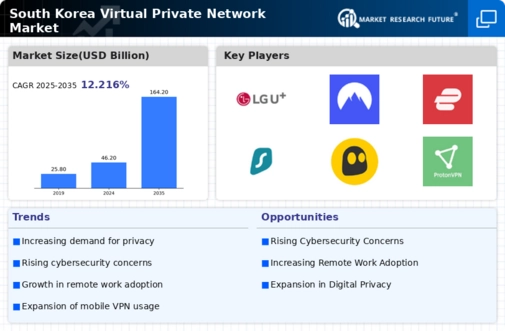South Korea Virtual Private Network Market Summary
The South Korea Virtual Private Network Market is projected to experience substantial growth from 46.2 USD Billion in 2024 to 164.2 USD Billion by 2035.
Key Market Trends & Highlights
South Korea Virtual Private Network Market Key Trends and Highlights
- The market is expected to grow at a compound annual growth rate of 12.22 percent from 2025 to 2035.
- By 2035, the market valuation is anticipated to reach 164.2 USD Billion, indicating robust expansion.
- In 2024, the market is valued at 46.2 USD Billion, reflecting a strong current demand for VPN services.
- Growing adoption of cybersecurity measures due to increasing data privacy concerns is a major market driver.
Market Size & Forecast
| 2024 Market Size | 46.2 (USD Billion) |
| 2035 Market Size | 164.2 (USD Billion) |
| CAGR (2025-2035) | 12.22% |
Major Players
LG Uplus, SK Telecom, KT Corporation, NordVPN, ExpressVPN, Surfshark, CyberGhost, ProtonVPN, PureVPN, Private Internet Access


















